

Comment j'ai expérimenté un MOOC avec mes étudiants-cobayes. Issu de la "génération intermédiaire", j'enseigne avec une vision partagée entre la tradition pédagogique, celle qui pense que "rien peut remplacer le tableau blanc", et une vision plus "digitale", pionnière dans l'expérimentation des nouveaux outils dans l'enseignement supérieur.
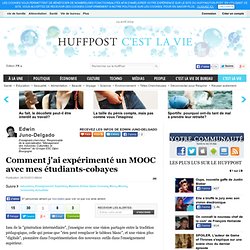
Le règne de l'image Cela fait une éternité digitale déjà (à peu près dix ans en temps ordinaire) que notre bon tableau blanc a été violemment remplacé par les tableaux power point. Nous sommes aujourd'hui des experts dans le maniement des slides, des animations et des présentations dynamiques, qui contribuent à un meilleur transfert des connaissances. Nous avons intégré l'adage "rien ne vaut une image" pour bien illustrer nos propos. Ainsi, pour faire passer un enseignement, pour que nos chers étudiants comprennent quelle est la différence entre "entreprise" et "économie", il est préférable - disent les digital experts - d'user d'une image comme par exemple celle du Penseur de Rodin. MOOCs Could Help 2-Year Colleges and Their Students, Says Bill Gates - Technology. By Katherine Mangan Seattle Community colleges have generally cast a wary eye toward massive open online courses, or MOOCs.
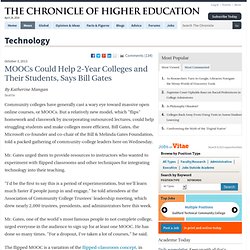
But a relatively new model, which "flips" homework and classwork by incorporating outsourced lectures, could help struggling students and make colleges more efficient, Bill Gates, the Microsoft co-founder and co-chair of the Bill & Melinda Gates Foundation, told a packed gathering of community-college leaders here on Wednesday. Mr. Gates urged them to provide resources to instructors who wanted to experiment with flipped classrooms and other techniques for integrating technology into their teaching.
"I'd be the first to say this is a period of experimentation, but we'll learn much faster if people jump in and engage," he told attendees at the Association of Community College Trustees' leadership meeting, which drew nearly 2,000 trustees, presidents, and administrators here this week. Mr. Remedial Students Benefit Mr. Bill Gates Brings MOOCs to Community Colleges : Education : Our Work. Bill Gates has spoken: higher education, especially the kind offered by community colleges, would be greatly improved by the adoption of massive open online courses (MOOCs).
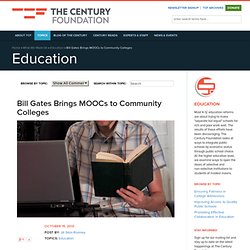
As reported by The Chronicle of Higher Education, Gates suggests colleges adopt the “flipped MOOC” model for their courses, providing students with canned pre-recorded lectures to “free up” classroom time for homework assistance. He believes the flipped MOOC may be a way for instructors to integrate technology and make community colleges more efficient. As a community college professor, I have significant concerns about this.
The idea of a flipped MOOC taking the place of a live lecturer could pose problems for millions of students who require more direct guidance and interaction. How Online Courses Can Form a Basis for On-Campus Teaching. Moocs are a good alternative to books. Panagiotis Tsigaris found the online learning tool to be a positive addition to his courses Source: Ian Summers There has been a lot of hype about the potential for massive open online courses to revolutionise university teaching.
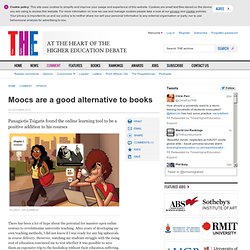
After years of developing my own teaching methods, I did not know if I was ready for any big upheavals in course delivery. However, watching my students struggle with the rising cost of education convinced me to test whether it was possible to save them an expensive trip to the bookshop without their education suffering. With this in mind, I decided to change the way I would deliver my introductory economics class last semester.
The switch was intimidating. One thing I decided straight away was that I would not be giving up my role at the front of the classroom entirely. Through classroom games and other interactive exercises I have developed over the years, I am able to demonstrate economic principles in fun and engaging ways, as students have attested. Can MOOCs Revolutionize the College Transcript? This rise of the MOOC has spurred a reexamination of many entrenched higher education practices, such as the typical college course and how it's taught.
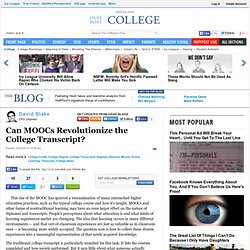
MOOCs and other forms of nontraditional learning may have an even larger effect on the nature of diplomas and transcripts. People's perceptions about what education is and what kinds of learning experiences matter are changing. The idea that learning occurs in many different environments -- and that out-of-classroom experiences are just as valuable as in-classroom ones -- is becoming more widely accepted. The question now is how to collect these diverse experiences into a meaningful representation of that newly acquired knowledge. The traditional college transcript is particularly unsuited for this task.
George Siemens, who along with Stephen Downes ran the first MOOC in 2008, recently told the Globe and Mail that he thinks we might be moving toward a "portfolio model of learning. " An early report card on MOOCs. How Coursera Could Walk the Talk About MOOC-wrapping. Daphne Koller, co-founder of Coursera, wrote an article in Forbes this week about the possibility of MOOC-wrapping and mixed models of online/traditional delivery that incorporate free globally offered online courses.
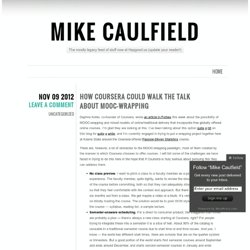
I’m glad they are looking at this. I’ve been talking about this option quite a bit on this blog for quite a while , and I’m currently engaged in trying to put a wrapping project together here at Keene State around the Coursera-offered Passion-Driven Statistics course. There are, however, a lot of obstacles to the MOOC-wrapping paradigm, most of them created by the manner in which Coursera chooses to offer courses.
I will list some of the challenges we have faced in trying to do this here in the hope that if Coursera is truly serious about pursuing this they can address them. No class preview . That said, there are some things Coursera is doing that help, and could be further advanced: One to two credit courses are wonderful. World Bank, Coursera to take MOOCs to developing world. Developing countries worldwide are to benefit from an agreement signed last Tuesday by the World Bank Group and Coursera, a leading provider of MOOCs – massive open online courses.
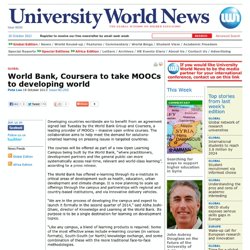
The collaboration aims to help meet the demand for solutions-oriented learning on pressing issues in targeted countries. The courses will be offered as part of a new Open Learning Campus being built by the World Bank, “where practitioners, development partners and the general public can more systematically access real-time, relevant and world-class learning”, according to a press release. The World Bank has offered e-learning through its e-institute in critical areas of development such as health, education, urban development and climate change. It is now planning to scale up offerings through the campus and partnerships with regional and country-based institutions, and via innovative delivery vehicles.
“Like any campus, a blend of learning products is required. Cours en ligne: pour réenchanter la révolution Mooc, passez aux Spoc. Temps de lecture: 6 min Durant un an ou deux, les cours gratuits en ligne ont semblé être l’avenir tout tracé de l’enseignement supérieur.
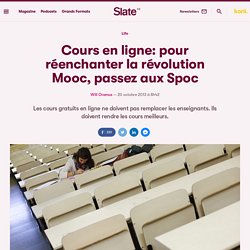
Pourquoi, s’étaient demandé plusieurs spécialistes influents de l’informatique, avoir des milliers de lycées et d’universités donnant tous le même cours à de petits groupes d’étudiants à travers le pays, lorsqu’il est possible de voir le même cours dispensé au monde entier par un seul enseignant particulièrement brillant via Internet? Dans un article de Wired paru en mars 2012 à ce propos, Sebastian Thrun, fondateur d’Udacity et spécialiste en intelligence artificielle de l’université de Stanford, prévoyait qu’il ne resterait plus dans dix ans qu’une dizaine d’institutions d’enseignement supérieur au monde. Et Udacity, estimait-il, pourrait en faire partie. Toutefois, cette prédiction semble aujourd’hui grandement exagérée. Et si ces cours complétaient les autres?
Anant Agarwal, président d’EdX, pense que c’est possible.